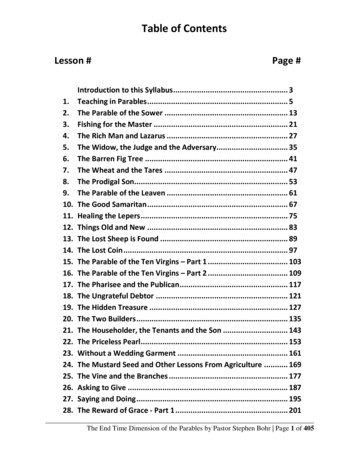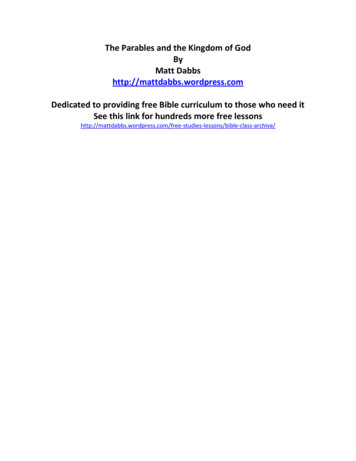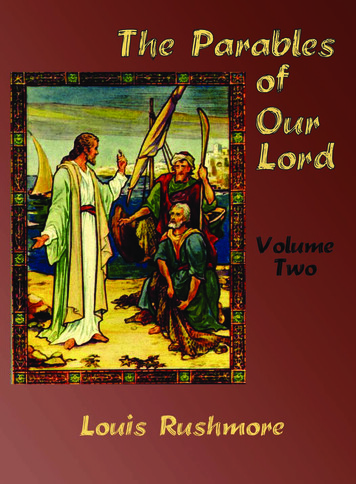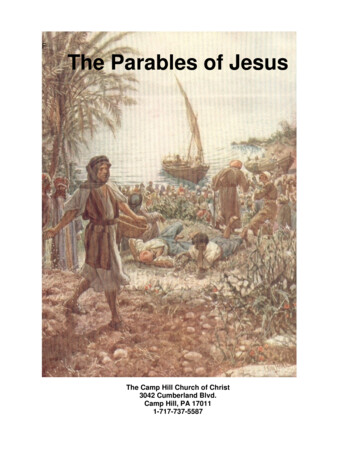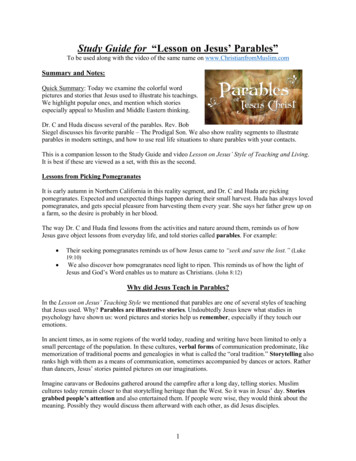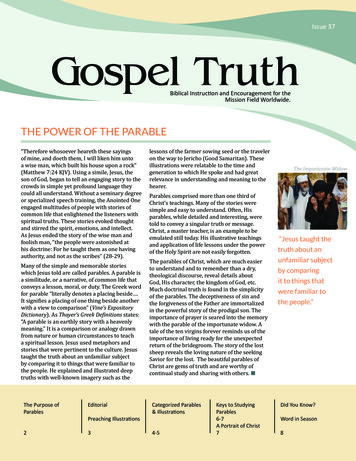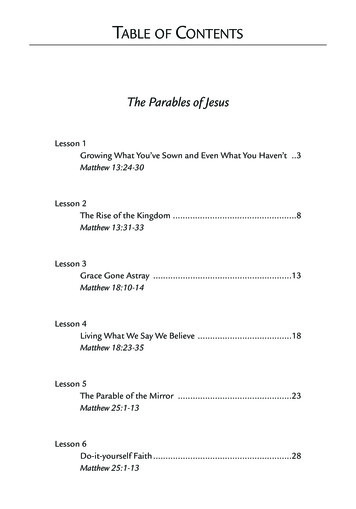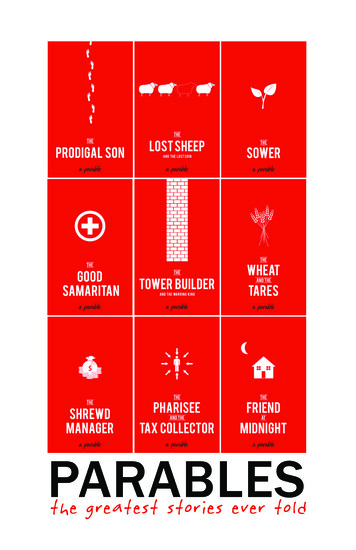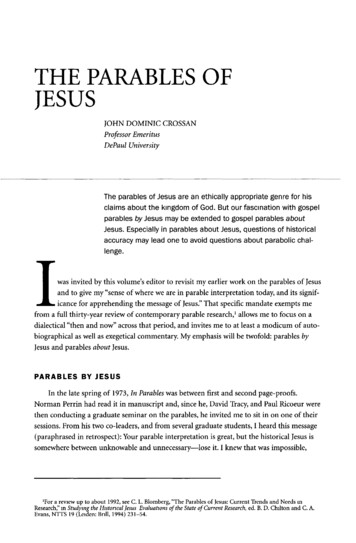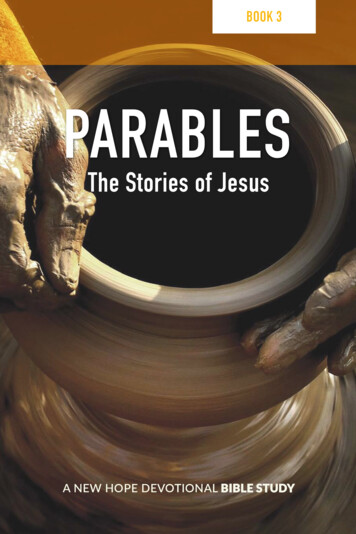
Transcription
BOOK 3PARABLESThe Stories of JesusA NEW HOPE DEVOTIONAL BIBLE STUDY
INTRODUCTIONParables are stunning word pictures that transfer reality from the throne room ofGod to the world of humans. Jesus told stories about commonplace activities toillustrate heavenly truth. He used parables to correct wrong thinking related to Hiskingdom, clarify biblical concepts and to explain how to properly relate with God(and others).The Jewish religious leadership were wrongly convinced of what theologians’ call“Compensation Theology”. This theology teaches that humans must perform to arighteous standard and then be compensated with benefits like, in the case of thePharisees, citizenship in God’s kingdom. Jesus used parables to deconstruct theidea that God’s verdict of “not guilty” can be earned through human means. God’srighteousness must be gifted to unworthy recipients by faith. This book opens witha law teacher asking Jesus how righteous he needed to be to gain entrance intoGod’s kingdom. Jesus shattered his self-righteous confidence with the parable ofThe Good Samaritan.The Pharisees understood Jesus’s clear message of grace apart from works butthey bitterly rejected it. They hated Jesus with a vengeance. By the end of thisbook Jesus was living east of the Jordan where the religious leaders could notharm him. Everywhere Jesus went He healed, served tirelessly, loved on peopleand taught in parables.My son, Ric Bruce III acted as editor-in-chief. Katie Scott, missionary to Haiti,painstakingly proofread each lesson. Darla Prether, New Hope’s graphic designerlabored with intensity to make this book so aesthetically pleasing. Samantha Fray,New Hope’s website administrator, is doing a wonderful job establishing an onlinepresence for The Parables of Jesus.Some of you will be studying this book in a small group setting. You will be encouraged to listen to Pastor Mark’s sermon(s) on each lesson before discussing it inyour small group. Some of the topics will ignite lively conversation. Jesus usedcontroversial topics like divorce, slavery, and money to help make His point. Iinterpreted each parable for you but the Spirit of God will apply it individually toyour life. Trust God to enable you to learn from His Word, love others sacrificially,worship Him exclusively and pray diligently. We included a page with small groupinstructions that highlights both learning and doing.God has gifted us with a mind to understand Him, a heart to love Him, and a will tochoose Him. He gave us His eternal Word to lovingly communicate reality to youand I. He gave us the command, “Be diligent to present yourself approved to Godas a workman who does not need to be ashamed, accurately handling the word oftruth”. (2 Timothy 2:15) Welcome to The Parables, The Stories of Jesus, Book 3.Rich Bruce, Discipleship PastorNEW HOPE CHURCH2170 E. SAGINAW HWY EAST LANSING, MI 48823 NHCHURCH.COM
SMALL GROUP DISCUSSION QUESTIONSThe purpose of the Small Group Ministry is to be a vessel, throughcommunity, for discipleship. Small Groups are meant to reinforce thefour scriptural principles set forth as the purpose of New Hope Church:"The purpose of this church is to glorify God by producing maturingfollowers (disciples) of Jesus Christ through the four scriptural principlesof Learning, Loving, Worship and Prayer."Small Groups will seek to accomplish this through creating a safe andsupportive atmosphere for people to wrestle with the truths of God asthey mature in their faith.Based on this week’s Scripture, sermon, and devotional reading, pleaseconsider the following questions:GODPastor Mark says, "What you believe about God determines whatyou do next."1What do you believe about God? What do you learn about God’scharacter from this week’s Scripture passage, message, and devotional?2What stirs up praise, love, or thankfulness to God? During prayer time,PRAISE HIM for who He is, His character, His attributes, or THANKHIM for what He has done/is doing.DOPastor Mark says, "What you believe about God determines whatyou do next."1What do you learn about humanity or yourself specifically this week’sScripture passage, message, and devotional?2Is there something God is asking you to do? What do you believe youare to do next? How will you seek to be obedient to what you arelearning?3What is the tension/challenge in obeying God? Can you identify whatyou are feeling or what's causing a reaction?45How can your small group support you in yielding to what God wants to do?How can you pray for yourself or others according to these verses?PRAYER TIME
CONTENTS1 THE GOOD SAMARITAN2 THE PERSISTANT FRIEND3 THE RICH FOOL4 THE FAITHFUL SERVANTS5 THE FRUITLESS FIG TREE6 SEATS AT A WEDDING FEAST7 THE GREAT BANQUET8 THE TOWER BUILDER & THE KING9 THE SEARCHING SHEPHERD, WOMAN & FATHER10 THE PRUDENT MANAGER11 THE RICH MAN & THE BEGGAR12 THE UNWORTHY SLAVE
LESSON 1THE GOOD SAMARITANJesus left Capernaum and began anintensely emotional 6-month journeythat ended with His grisly earthly death.1 Onthis last leg of the journey, He manifested awide range of emotions - from graveconcern for the disciples competing forkingdom importance to uncontrolledsobbing at the home of his dead friendLazarus. He also expressed anger at Jamesand John when they offered to call fire downon a Samaritan village that rejected Him(Luke 9:52-56). Yet through it all, He was theperfect God-man with perfect emotion.One day, an expert in Jewish law arrived toput Rabbi Jesus to the test. He intended todiscredit Jesus and turn the crowds fromHim. “Teacher,” he asked, “What must I doto inherit eternal life?” Jesus responded withtwo questions, “What is written in the Law?”and, “How do you read it?” (Luke 10: 26).The law expert gave the expected self-righteous answer by rehearsing the commandsto love God with all his “strength, soul andmind” and to love “neighbors” as much ashe loved himself. He had memorized this asa mantra from a young age and probablyrecited it automatically, without thinking.Jesus told Him that if He performed thosecommands perfectly, he would inheriteternal life. However, the Law expert continued to hound Jesus by asking, “Who is myneighbor?” (Luke 10:29). Jesus respondedwith the following parable.For the next several months Jesus livednear Jerusalem. To avoid the Jewishleaders he sought refuge on the oppositeside of the Jordan river. He continued tominister to the crowds publicly and defendHis authority privately to those braveenough to challenge Him.LUKE 10:30-37Jesus replied and said, “A man was goingdown from Jerusalem to Jericho, and fellamong robbers, and they stripped him andbeat him, and went away leaving him half dead. 31 And by chance a priest was going downon that road, and when he saw him, he passed by on the other side. 32 Likewise a Levitealso, when he came to the place and saw him, passed by on the other side. 33 But aSamaritan, who was on a journey, came upon him; and when he saw him, he felt compassion, 34 and came to him and bandaged up his wounds, pouring oil and wine on them; andhe put him on his own beast, and brought him to an inn and took care of him. 35 On thenext day he took out two denarii and gave them to the innkeeper and said, ‘Take care ofhim; and whatever more you spend, when I return I will repay you.’ 36 Which of these threedo you think proved to be a neighbor to the man who fell into the robbers’ hands?” 37 Andhe said, “The one who showed mercy toward him.” Then Jesus said to him, “Go and do thesame.”Bdebate and conversation by scholars.These pharisaic debates culminated insending hostile delegations with loadedtheological questions to Jesus. Jesuswisely responded with fitting word picturesthat brought His accusers back to reality.y this time, it was widely known thatJesus had rejected the legalisticrighteousness of the esteemed Pharisees.Jesus demanded God’s perfection as aprerequisite to enter the kingdom of God.This other-worldly prerequisite of Jesuslikely prompted endless hours of private1
Consider the following about this parable:thoughts of hatred and disgust in the Jews.The Jewish leaders disparagingly referredto Jesus as a “Samaritan” (John 8:48).Jesus showed atypical kindness to theSamaritans throughout His earthly ministry. As a result, many Samaritans came tofaith in Jesus.The law expert was literally asking Jesushow righteous he needed to be to makehimself eligible for the kingdom Jesuswas offering.1 Jesus told the scholar that ifHe kept the law perfectly, he would meetthe requirements. Feeling a tinge of uncertainty, the law expert pushed Jesus for adefinition of his “neighbor”. Jesus shared ajarring example with him of a hated Samaritan’s selfless love and his neighborly actstoward an undeserving racist. Jesus wassetting up an impossible scenario to provethat the Jewish Law teacher did not keepGod’s law perfectly and therefore wasdisqualified for God’s eternal kingdom.The road from Jerusalem to Jerichodescended 3,300 feet in just 17 miles. Itwas a lonely, treacherous road thatgave bandits many places to lie in wait forunsuspectingtravelers. Theattackdescribed in the parable was especiallyvicious since the bandits beat the man, tookhis clothes, and left him for dead. The twodenarii spoken of in the parable would havebeen worth about two days wages.Historically, Jews loathed the Samaritanpeople. The Samaritans considered Mt.Gerazim as the sacred meeting place ofGod (not Jerusalem). The only Old Testament prophet they recognized was Mosesand they only accepted the first 5 books ofthe Bible as inspired. The Jews tracedtheir lineage to Abraham while the Samaritans were gentiles mixed with Jewishbloodlines. In an ancient world of pedigreeand privilege, the Samaritans provokedThis story would have left the self-justifiedlaw teacher speechless, as he realized thatthe Law he revered to save him was thesame law that condemned him. He wouldhave understood that he didn’t and couldn’tlove as God prescribed in the Law. Thisparable served as a sobering epiphany ofGod’s definition of love and the law teacher’s inability to follow it.POINT TO PONDERAs Jesus modeled laying down His life for us, we ought to do the same for others (1 John3:16).FROM LEARNING TO LIVINGLook for a God-orchestrated opportunity to radically love a fellow human across culturalbarriers. This could take the form of a simple smile, a warm handshake, or a gospelsharing opportunity.PRAYER POINT“Thank you God for these compelling parable word pictures that you paint to bring me backto reality. May I admit my humble, needy state. Thank you for scooping me up off the roadand being my good Samaritan.”2
LESSON 2THE PERSISTENT FRIENDJesus took full advantage of the Jewishfeasts that occurred during His travellingministry in Judea. During these festivals thecity of Jerusalem would fill with worshippers from the four corners of Israel. Jesusquietly entered Jerusalem to celebrate thefeasts and to minister to the crowds. Themiracles Jesus performed there appealedto the sentiments of the crowds, but theyincited the jealous hatred of the leaders.(John 7:31) The Jewish leaders looked fora way to arrest or harm Jesus, but theyaltered their plans because they feared thefestive crowds. (Matthew 21:46)with enthusiastic reports of God’s miraculous work through them. (Luke 10:17)Lazarus, Martha, and Mary received Jesusinto their home as He travelled east fromJerusalem. Mary evidenced a preparedheart by listening intently to Jesus’s teaching while sitting at His feet. Martha becameirritated at Mary for not being hospitable.Jesus rebuked Martha by saying, “ butonly one thing is necessary, Mary haschosen the better part, which shall not betaken away from her.” (Luke 10:42) Marychose God’s rule in Jesus while Marthachose lonesome, busy self-rule.During the Feast of Tabernacles, Jesusgathered his disciples and He sent outseventy-two as missionaries in pairs. Jesustasked them with healing the sick, announcing the kingdom of God, and preparingevery town and village around Jerusalemfor Jesus’ arrival. The disciples returnedMinistry out in the Judean countryside wasintense. After the disciples returned, Jesustaught them about prayer. They knew thatthroughout Biblical history prayer had beena marker of healthy dependence on God.He taught them the following prayer andshared another parable with them:LUKE 11:1-10It happened that while Jesus was praying in acertain place, after He had finished, one of Hisdisciples said to Him, “Lord, teach us to pray justas John also taught his disciples.” 2 And He said to them, “When you pray, say: ‘Father,hallowed be Your name.Your kingdom come. 3 Give us each day our daily bread. 4 Andforgive us our sins, for we ourselves also forgive everyone who is indebted to us. And leadus not into temptation.’”5 Then He said to them, “Suppose one of you has a friend, and goes to him at midnight andsays to him, ‘Friend, lend me three loaves; 6 for a friend of mine has come to me from ajourney, and I have nothing to set before him’; 7 and from inside he answers and says, ‘Donot bother me; the door has already been shut and my children and I are in bed; I cannotget up and give you anything.’ 8 I tell you, even though he will not get up and give himanything because he is his friend, yet because of his persistence he will get up and givehim as much as he needs. 9 “So I say to you, ask, and it will be given to you; seek, and youwill find; knock, and it will be opened to you. 10 For everyone who asks, receives; and hewho seeks, finds; and to him who knocks, it will be opened.Luke records many aspects of Jesus’sprayers. Jesus offered prayers ofthanksgiving (10:21), prayers of communion with God (3:21: 5:16), Jesus requested3
specific things from God (22:42) and Heoffered intercession on behalf of others(22:32). The only feature not evident inJesus’s prayers is confession of sin. Thesinlessness of Jesus is continually re-enforced throughout scripture.Before the era of cars and airplanes,travelers carefully planned their trips toarrive at a destination safely beforedark. Difficult, unforeseen circumstancesmust have caused the traveler in theparable to arrive at midnight.Consider the following:Jewish houses typically consisted of oneroom. At night, the “living room” was convertedinto a communal bedroom. A door bolted shutmeant that the family was sleeping andtherefore unavailable. This interruption forcedthe entire family to wake up and attend to thevisitor. The cultural setting and the wording ofthis passage in the original Greek languagemakes it clear that the borrower shamelesslypestered the slumbering family until the friendarose and gave him what he was asking for.1It is important to note that until this timein Jewish religious history, intercessorypriestly prayer was the standard for thechildren of Israel. Only male members ofthe tribe of Levi could perform ceremonialtemple worship. Only male descendants ofAaron could serve as high priests. Justonce a year, one privileged high priestpassed beyond the temple veil to speak toGod on behalf of Israel directly. A rope wastied to him in case God struck Him dead forbeing ceremonially unclean in Hispresence.Jesus presents a new model of prayerfeaturing closeness, proximity and privilege.The ancient listener would have heard theprayer begin like this, “Daddy God, Let yourname be kept famously holy ” Thisindicates a new, previously unheard ofrelational closeness to God. The late-nightavailability of the owner of the house (God) tomeet the pressing needs of the traveler andHis weary companion indicates proximity andavailability. The travelers in the parable areprivileged to be identified as a friend of theowner. Likewise, we, as believers, are friendsof God (Philippians 2:5-11).The Pharisees had developed their ownsystem of approaching God in prayer. Theyprayed in public with great pretentiousnessthree times a day. Jesus rebuked theseempty prayers as prideful and self-serving(Luke 18:9-14). John the Baptist’s form ofprayer showcased a fresh model of prayerthat the disciples of Jesus wanted tounderstand better.POINT TO PONDERThe sincerity, intensity and regularity of my prayers indicates how much I truly rely on Godand take advantage of His proximity.FROM LEARNING TO LIVINGPray the Lord’s Prayer this week. Pray for Daddy God to be made famous and for His ruleto be accepted by faith everywhere. Surrender self-rule and look to Him to meet your dailyneeds (not wants). Humbly recognize that God’s gracious forgiveness is the model forforgiving others. Pray for Daddy God to take your hand and steer you clear of temptation.PRAYER POINT“Daddy God, you went to the slave market of sin, bought me with your innocent blood, andthen took my place. You adopted me, gave me your name, and loved me unselfishly. May eachmoment of my life with you be marked by a grateful response of dependent, childlike prayer.”4
LESSON 3THE RICH FOOLJintensified when he called them, “unmarkedgraves, which men walk over withoutknowing it” (Luke 11:42-44). They becameenraged when He told them they would beheld responsible for all the blood of God’smartyred prophets from Abel to Zechariah(Luke 11:47-51).esus often railed against the Jewishleaders. He indicted the Pharisees oncharges of corruption, pride, hypocrisy andhardheartedness. On one of theseoccasions, the leaders rebuked Jesus fornot washing ceremonially before dinner.Jesus responded, “Now you Phariseescleanse the outside of the cup and of thedish, but inside you are full of greed andwickedness. You fools!” (Luke 11:38-41;Matthew 23:25-26). Jesus regularly issuedsweeping indictments on the Pharisees, tothe point they defined his ministry and life.An unexpected interruption caused Jesus todivert His attention. A petty, earthly-mindedman cried out to Jesus asking Him to makea brother divide the family’s inheritance withhim. Jesus responded to his untimelyrequest with the following parable The weight of Jesus’s judgement on themLUKE 12:16-2116 And He told them a parable, saying, “Theland of a rich man was very productive. 17 Andhe began reasoning to himself, saying, ‘Whatshall I do, since I have no place to store my crops?’ 18 Then he said, ‘This is what I will do:I will tear down my barns and build larger ones, and there I will store all my grain and mygoods. 19 And I will say to my soul, “Soul, you have many goods laid up for many years tocome; take your ease, eat, drink and be merry.”’ 20 But God said to him, ‘You fool! Thisvery night your soul is required of you; and now who will own what you have prepared?’ 21So is the man who stores up treasure for himself, and is not rich toward God.”Jesus experienced waves of humanemotion as God in the flesh. He lived toserve as Savior and King, but the peopleHe came to save rejected Him outright orsought relief for their temporal needs.Some hoped for food, others sought justiceand still others desired physical healing.What a tragedy!but more than 20,000 servants scatteredthroughout the empire held importantadministrative positions. They commandedrespect and honor along with the expectedeconomic advantages.An impossible chasm existed between thethree upper classes and the bottom four.Small business owners, the free poor,freedmen, and slaves made up these fourlower classes. Butchers, bakers, barbers,etc. made up the small business owners'caste. These men and women eked out aliving by producing goods and serviceseach day. Roman citizens unable to starttheir own business comprised the free poor.They worked for small business owners orpracticed a trade. Paul, the tentmaker, wasprobably from this class. Freedmen wereConsider the following:Scholars identify seven distinct socialclasses in the Roman world.1 Equestrians, Decurions, and Caesar’s household occupied the three upper classes. TheEquestrians were wealthy landowners.The Decurions ruled provincial cities fromvast, palatial estates. Caesar’s Householdformed the primary ruling class. Caesarhimself was at the top of the social order,5
and build new ones to hold grain the builderscould hardly afford.slaves who had purchased their ownfreedom or had been set free by theirowners. They typically worked as daylaborers for a small wage. The lowest classwere the slaves. The devastating effects ofslavery were felt throughout the empire.The Rich man in the parable committedthree very grave errors in the use of hisfinances. First, he didn’t recognize theearthly shortsightedness of desiring more.Second, he didn’t gratefully recognize Godas the ultimate source of everything heowned (stewardship), and finally, he didn’trealize how his wealth could have beenleveraged to help others on earth forrewards in eternity.2 Jesus didn’t condemnaccumulating wealth with integrity. Hesimply exposed the error of misusingwealth by adopting shortsighted, indulgent,earthly thinking around it.The three upper classes of Jesus’ timewere unspeakably wealthy. The rest livedwith great economic uncertainty and manystruggled to feed themselves. While Jesuscapitalized on the tension of economicdisparity to drive His point home abouteternal priorities, it should be noted thatthis parable is not a sweeping indictmenton those who have more than others. Therich man in the parable would haveexploited day laborers to tear down barnsPOINT TO PONDER“ For where your treasure is, there your heart will be also.” (Matthew 6:21)FROM LEARNING TO LIVINGLook over your bank statement this week and assess where your priorities lie. Are youinvesting an appropriate amount of time and money in eternity or do you seem to have a“I need it right here, right now” approach to life? Ask God to show you the next step.PRAYER POINT“Dear God of eternity, You see all our yesterdays and all our tomorrows as the same moment.I pray that I’ll keep in step with your Spirit and view the eternal souls of men and women as thewisest investment of my time and money.”6
LESSON 4THE FAITHFUL SERVANTSAlife on earth. Try to picture the Lord Jesusgently offering His listeners a chance to livewith anticipation for His kingdom instead ofdesperately longing for the things of thisworld. Carefully observe in the followingparable how Jesus used a wedding, apotential home invasion, and a harshtaskmaster as earthly examples to illustratethe importance of having a “kingdom-ready”mindset.s finite human beings, we have limitedattention spans. Jesus intentionallyused brief parables to highlight heavenlytruth with earthly word pictures. In the lastparable, He discouraged his listeners fromfocusing on earthly wealth.Jesus offered kingdom preparedness as apositive alternative to preoccupation withLUKE 12:35-48“Be dressed in readiness, and keep yourlamps lit. 36 Be like men who are waiting fortheir master when he returns from thewedding feast, so that they may immediately open the door to him when he comes andknocks. 37 Blessed are those slaves whom the master will find on the alert when hecomes; truly I say to you, that he will gird himself to serve, and have them recline at thetable, and will come up and wait on them. 38 Whether he comes in the second watch, oreven in the third, and finds them so, blessed are those slaves.39 “But be sure of this, that if the head of the house had known at what hour the thief wascoming, he would not have allowed his house to be broken into. 40 You too, be ready; forthe Son of Man is coming at an hour that you do not expect.” 41 Peter said, “Lord, are Youaddressing this parable to us, or to everyone else as well?” 42 And the Lord said, “Whothen is the faithful and sensible steward, whom his master will put in charge of his servants,to give them their rations at the proper time? 43 Blessed is that slave whom his masterfinds so doing when he comes. 44 Truly I say to you that he will put him in charge of all hispossessions. 45 But if that slave says in his heart, ‘My master will be a long time in coming,’and begins to beat the slaves, both men and women, and to eat and drink and get drunk;46 the master of that slave will come on a day when he does not expect him and at an hourhe does not know, and will cut him in pieces, and assign him a place with the unbelievers.Responsibility and stewardship emergeas key themes in this parable. Theseprinciples would have resonated with Hislisteners. Ancient servants embraced theirresponsibilities as a call of duty. Deterministic thinking prevailed among rich and pooralike, leading to a strong sense of honorand obligation. The ancients believed fate(the universe) predetermined a person’sstation in life and that he/she must fulfilltheir duty. The ancients believed that thefate of the entire universe hinged on eachperson humbly accepting their fate.1 Thelisteners of Jesus would have identifiedwith the dutiful servants in the parable.Consider the following:A binding marriage in the ancient worldconsisted of three festive but verydistinctceremonies.Engagementmarked the first stage of a marriage. Anengagement was arranged either byparents or a professional matchmaker.These “fixers” are often cast in modernmovies as senseless busybodies but in theancient world they were held in much7
plan, running out of wine or food would haveinsulted the guests and brought shame tothe father of the groom. After the wedding,the couple returned to the groom’s house tospend their honeymoon. The groom and hisnew bride returned home to his loyalservants after an exhausting week offeasting. The servants’ eager anticipation forthe master’s unannounced return signaledselfless loyalty. He rewarded them with acelebration of their own.higher esteem. Serving as gatekeepers ofcultural heritage, matchmakers commanded universal respect. The engagement wasmore contractual than romantic, sincemany times the bride and groom were stillchildren or hadn’t even met each other. Theinvolved parties left the negotiations with alegally binding marriage contract.As the couple approached marryingage, the parents and the communitywould have sensed the couple’sreadiness to move forward in the process. Aone-year period of betrothal began with anelaborate feast. The betrothal fulfilled theengagement contract. Infidelity during thistime was considered adultery and groundsfor divorce. Mary, the wife of Joseph waspregnant with Jesus during this time ofbetrothal. This period culminated with thecouple’s wedding.Jesus addressed Peter’s unasked question, “If you don’t establish your kingdomnow, what do we do while we wait?”. Jesuspatiently explained that the messianickingdom will take place. In the meantime,God’s people must live like preparedservants who expect the spontaneousreturn of their beloved master at anyminute. Similarly, God’s people must livelike attentive homeowners, sleeping lightlyto protect their family from possible intruders. Jesus also provides a negative example of a harsh taskmaster. This man livedwithout regard for his master’s promisedreturn and chose to indulge his fleshly,earthly desires by getting drunk andmistreating others. The wise servants livedwith expectant hearts, preparing for themaster’s unscheduled return.After months of preparations, a loudfestive procession picked up the bride ather home. The entire communityescorted the bride to her wedding withboisterous singing, dancing, and evenprophetic chanting describing the couple’shappy future together. At the ceremony, thebride and groom were celebrated like a kingand queen during the 7-14 day weddingfeast.2 Because the host had a full year toPOINT TO PONDERWhat percentage of my time do I spend getting ready in this life to be with the King ofKings in the next?FROM LEARNING TO LIVINGMake a list of the areas of your life that are not “kingdom-ready.” Write down those areasthat would bring you shame if the master came “home” early. These areas can includefinances, relationships, etc. Pray and ask God for next steps to deal with faulty perspectives. Seek the help of a more spiritually mature person.PRAYER POINT“Dear soon returning God, I pray that your imminent arrival may become the meditation of myheart. I pray that I will ponder my heavenly responsibilities while here on earth. Guard my soulfrom taking advantage of this waiting period by becoming entangled with the affairs of thisshort, temporal life.”8
LESSON 5THE FRUITLESS FIG TREEThe crowds grew anxious. In the lastparable, the master (God) cut theabusive, inattentive servant (unbelievingIsrael) into pieces and assigned him aplace with unbelievers (Luke 12:46). Thisindicated that not only could God’skingdom rule be ignored, but thatdevastating consequences awaited thosewho rejected God’s rule . Each listenerneeded to evaluate their own willingnessto trust Jesus.messianic “barometer” of events unfoldingright in their midst (Luke 12:54-56).To further His point, Jesus likened theirperilous situation to an offender beingforcibly hauled into court by an angryadversary. (Luke 12:57-59) In their mind’seye, the people pictured a stern, accusatoryplaintiff making a public spectacle of adisadvantaged defendant. In the same waya doomed defender would desperately tryto settle out of court by begging for mercy,God’s people should take advantage of theshort time they have with the Messiah torepent.The promised redeemer, Messiah Jesus,had arrived. Despite the overwhelmingevidence, many still questioned anddoubted His identity. Speaking directly tothe crowds, Jesus sternly warned them notto dismiss Him as an imposter (Luke12:47-48).Someone in the crowd raised a questionabout a situation where Pontius Pilate hadslaughtered Galilean Jews in the templecourt. The ensuing bloodbath caused theirblood to mix with their sacrifices at thetemple. The crowd wrestled with how Godcould have punished the Galilean worshippers with such a horrific death while vengeful thoughts against Rome burned in theirhearts. Jesus responded to their conflictedthoughts by reminding them of a tower thatunexpectedly fell and crushed 18 people atSiloam. Jesus pointed out that catastrophicevents are not directly related to individualsin. Capital
presence for The Parables of Jesus. Some of you will be studying this book in a small group setting. You will be encour - aged to listen to Pastor Mark’s sermon(s) on each lesson before discussing it in your small group. Some of the topics wil
